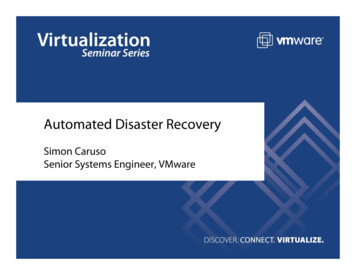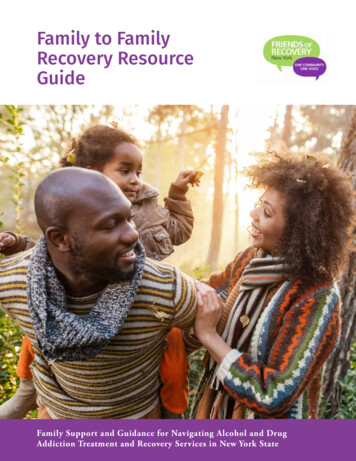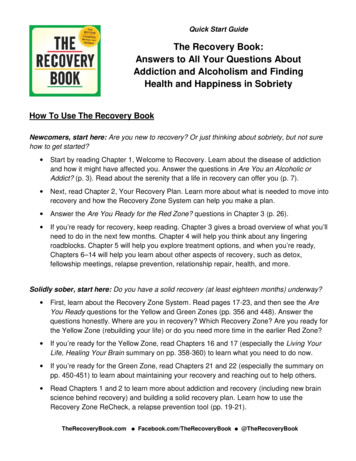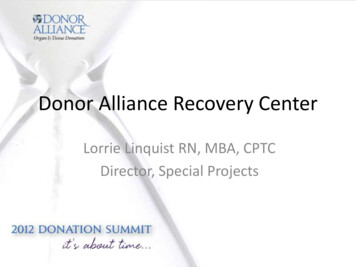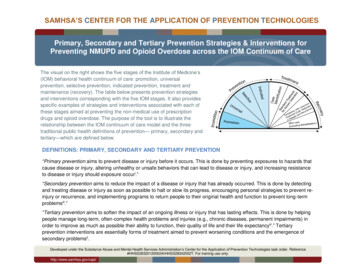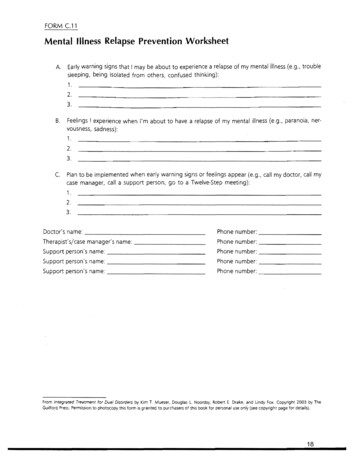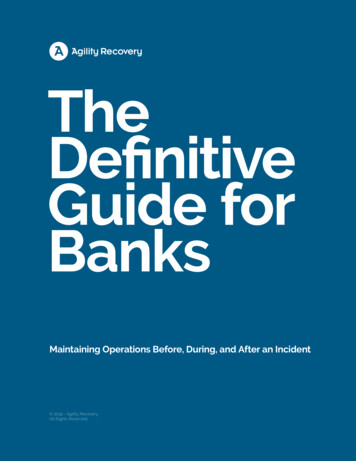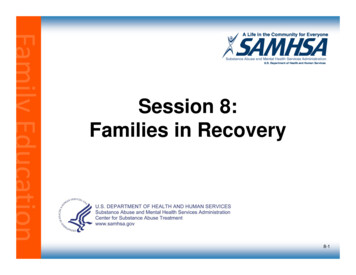
Transcription
Family EducationSession 8:Families in Recovery8-1
Family EducationWho Makes Up a Family? Members of your immediate family (parents,siblings, partner, children) Extended family Friends Colleagues from work Mentors Anyone who will support recoveryMatrix IOP8-2
Family EducationWhat Is Addiction? Addiction is a physical and emotionalresponse to chemicals we put in our bodies. Addiction is a medical disorder. It is not helpful to think of addiction in termsof morality and willpower.Matrix IOP8-3
Family EducationDevelopment of AddictionPrefrontal CortexLimbic SystemMatrix IOP8-4
Family EducationDevelopment of the Craving Response Cognitive process—Prefrontal cortex Conditioning process—Limbic system Obsessive thinkingMatrix IOP8-5
Family EducationCognitive ProcessBeginning Stages of AddictionNegative Aspects Employment disruptionPositive Aspects Relationship concerns Depression relief Financial problems Confidence boost Boredom relief Sexual enhancementMatrix IOP8-6
Family EducationCognitive ProcessDisenchantmentPositive Aspects Social currency Occasional euphoria Relief from lethargyNegative Aspects Nosebleeds, infections Financial jeopardy Relationship disruption Family distress Impending job lossMatrix IOP8-7
Family EducationConditioning ProcessMild CravingsStrength of Conditioned Connection:Triggers Parties Friday nights Friends Weight gainMild to Extra moneyModerate Intimate situations DepressionMatrix IOPResponses Thoughts of meth Mild physiologicalarousal Eager anticipationof use Cravings as useapproaches Occasional use8-8
Family EducationConditioning ProcessStrong CravingsStrength of Conditioned ConnectionTriggers elinessMatrix IOPResponsesStrong Continual thoughtsof meth Strong physiologicalarousal Strong cravings Frequent use8-9
Family EducationConditioning ProcessOverpowering CravingsStrength of Conditioned ConnectionTriggers ResponsesAny feelingDayNightUnemploymentWorkOverpoweringMatrix IOP Obsessivethoughtsabout meth Powerfulresponse Intense cravings Automatic use8-10
Family EducationDevelopment of Obsessive ThinkingEarly EXERCISEALCOHOLGIRLFRIENDMatrix IOP8-11
Family EducationDevelopment of Obsessive ThinkingContinued HMatrix IOP8-12
Family EducationProgressive Phases of Addiction x IOP8-13
Family EducationFamily Members’ Response toMeth UseIntroductory Phase Unaware of problem Confusion regardingoccasional odd behaviors Concerned aboutoccasional neglect ofresponsibilitiesMatrix IOP8-14
Family EducationFamily Members’ Response toMeth UseMaintenance Phase Are aware of theproblem Attempt to solve theproblem Take on allresponsibilitiesMatrix IOP8-15
Family EducationFamily Members’ Response toMeth UseDisenchantment Phase Avoidance of problemBlaming the person who is usingBlaming selvesGuilt and shameMatrix IOP8-16
Family EducationFamily Members’ Response toMeth UseDisaster Phase Separation Internalization ofbad feelings Resignation andhopelessness Establishment ofunhealthful familyrulesMatrix IOP8-17
Family EducationBenefits of Family Involvement Participation by family members isassociated with better treatment complianceand outcome. Family members gain a clearerunderstanding of recovery. Family members and the person in recoveryunderstand their respective roles and goals. Family members and the person in recoveryget support in the recovery process.Matrix IOP8-18
Family EducationStages of RecoveryMatrix IOPStageWithdrawalDuration1 to 2 weeksHoneymoon4 weeksThe Wall12 to 16 weeksReadjustment8 weeks or longer8-19
Family EducationWithdrawal Lasts 1 to 2 weeks Craving and depression Low energy, difficulty sleeping, increasedappetite, and difficulty concentratingMatrix IOP8-20
Family EducationHoneymoon Lasts about 4 weeks Increased energy, enthusiasm, and optimism People often feel they are “cured” when theyreach this stageMatrix IOP8-21
Family EducationThe Wall Lasts about 12 to 16 weeksHardest stage of recoveryDepression and irritabilityDifficulty concentratingLow energy and loss of enthusiasmHigh risk of relapseMatrix IOP8-22
Family EducationReadjustment 8 weeks or longer The person in recovery and the family beginreturning to more normal lifestyle After extended abstinence, the person inrecovery and family members begin workingon marital, emotional, and psychologicalissues that will strengthen the familyMatrix IOP8-23
Family EducationGoals for WithdrawalPerson in recovery Discontinue use of meth Learn specific techniques for avoidingrelapse Learn about the process of addiction andabout drug effectsFamily members Decide to be part of recovery process Recognize that addiction is a medicalconditionMatrix IOP8-24
Family EducationGoals for the HoneymoonPerson in recovery Improve physical health Identify personal triggers and relapsejustifications Use targeted techniques to stay abstinentFamily members Work to support recovery Recognize and discontinue triggeringinteractionsMatrix IOP8-25
Family EducationGoals for the WallPerson in recovery Maintain stable abstinence from all drugs Repair significant relationships Develop a recovery support system outside thetreatment center Recognize and cope with dangerous emotionsFamily members Decide whether to recommit to the relationship Begin finding ways to enrich own lives Practice healthy communication skillsMatrix IOP8-26
Family EducationGoals for ReadjustmentPerson in recovery Monitor components of successful recovery Recognize relapse indicators and prepareresponses Clarify new roles in healthy relationships Set goals for continuing a new lifestyle after theprogramFamily members Accept limitations of living with a person in recovery Develop an individual, healthy, balanced lifestyle Monitor self for relapses to former behaviors Be patient with the process of recoveryMatrix IOP8-27
Family EducationKey Relapse Issues for Peoplein Recovery Friends who use meth Environmental cues associated withmeth use Severe cravings Protracted abstinence—the Wall Connection between meth and sex BoredomMatrix IOP8-28
Family EducationKey Relapse Issues for Family Members Fear of the person in recovery returning tometh use Fear of being alone Lack of individual goals and interests Inability to release responsibility for theperson in recoveryMatrix IOP8-29
Matrix IOP 8-18 Benefits of Family Involvement Participation by family members is associated with better treatment compliance and outcome. Family members gain a clearer understanding of recovery. Family members and the person in recovery understand their respective roles and goals. Family members and the person in recovery
